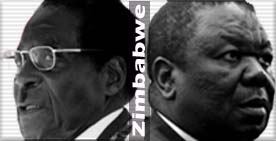End of an era: Zimbabwe's Tsvangirai on verge of power
 Johannesburg - After 10 years in the pro-democracy trenches, Zimbabwe's longtime opposition leader, Morgan Tsvangirai, is set to cement his pact with his arch-nemesis, Robert Mugabe, on Wednesday and be sworn in as prime minister of a unity government.
Johannesburg - After 10 years in the pro-democracy trenches, Zimbabwe's longtime opposition leader, Morgan Tsvangirai, is set to cement his pact with his arch-nemesis, Robert Mugabe, on Wednesday and be sworn in as prime minister of a unity government.
Supporters of Tsvangirai's Movement for Democratic Change (MDC) are expected to throng a football stadium in the capital Harare for a speech after the ceremony, which marks a milestone in the career of the politician derided by Mugabe as a Western lackey.
"The road ahead is long but we believe we must and can succeed, while learning from our sad past, which has devastated our people," Tsvangirai said Tuesday.
Wednesday's inauguration will be followed two days later by the swearing-in of a 31-member cabinet drawn from both the MDC and Mugabe's Zanu-PF.
Most of the MDC's ministers are unknown outside Zimbabwe, except for MDC secretary-general Tendai Biti, who has been given the unenviable task of finance minister.
Finance is the most prominent of the 13 ministries awarded to the MDC in a September power-sharing deal, which sees Mugabe and Tsvangirai share executive power in a French-style "cohabitation" arrangement.
Most of the other ministries controlled by the MDC have convoluted names, like "economic planning and investment promotion" and "constitutional and parliamentary affairs" that reflect their lesser importance compared to portfolios retained by Zanu-PF.
Mugabe's party retains foreign affairs, defence, justice and agriculture, among others.
This week's events mark a significant climbdown by the MDC, which held out for five months for a greater share of power on the basis that it won the last parliamentary elections.
But the pressure from Mugabe's allies, particularly South Africa, to get into government now - and leave the so-called sticking points to be resolved later - proved overwhelming.
Last week, an increasingly marginalized MDC voted in favour of Tsvangirai's proposal to continue the struggle to democratize Zimbabwe - from inside government.
"Do we have any other choice?" Biti asked after the vote. "Zimbabweans are suffering, dying or fleeing the country in their thousands. Let us give this experiment a chance."
The MDC's participation is seen as crucial to securing more donor funding to tackle the country's inflation, cholera and food crises. Over 3,300 people have died of cholera since August, mostly for lack of clean drinking water, and half the population of around 11 million cannot adequately feed itself.
Some recalcitrant MDC members also cited their desire to avoid another split in the party. In 2006, the party came apart following a dispute about whether to contest Senate elections.
"Morgan is a bigger brand than the MDC," one reluctant MDC official, who would not be named, said. "If we want the brand MDC to survive we must not publicly fight the president (of the party)."
"We must look at the environment he has created and see how we can create space to achieve the democratization of Zimbabwe," the official said.
Many Zimbabwean activists disagree with the strategy.
"When Morgen is sworn in tomorrow we will have a one-party government, a one-party parliament," Lovemore Madhuku, a lawyer and leader of the National Constitutional Assembly said.
"We must fight dictatorship from the outside and only get into government when there's a democratic government," Madhuku urged.
Casting a pall over Wednesday's proceedings will be the continued imprisonment of around 30 MDC members and opposition activists, most of whom were arrested on dubious charges of conspiring to topple Mugabe.
Mugabe has so far ignored calls by Tsvangirai for their release.
In a further ominous sign for the new government, the Zanu-PF ministers rumoured to retain their posts on Friday include many from Mugabe's last cabinet, which he himself described as "the worst in history." dpa